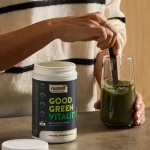
Gastroenterologists point out that over-the-counter digestive enzymes have little proof of their effectiveness in relieving heartburn.
People have used herbal supplements and natural remedies to manage gastroesophageal reflux disease (GERD) for years, though research results remain mixed. Some studies show promise – a 2017 study revealed that deglycyrrhizinated liquorice supplements might work better than certain antacid medications. Research from 2012 suggested that antioxidant vitamins could help prevent GERD symptoms.
Millions of people feel that familiar burning sensation in their chest, and picking the right supplement can be daunting with accessible natural options and synthetic formulations, each claiming to be the ultimate solution. This piece will guide you through the supplement world and help you make choices based on scientific evidence rather than marketing claims.
Understanding the difference between supplement types helps you make better choices to manage acid reflux. The market has both natural and synthetic options that come with their own benefits.
Natural supplements come from concentrated fruits, vegetables, and other whole foods [1]. These supplements contain a complete range of nutrients, minerals, and bioactive compounds that work together. The body absorbs and uses natural supplement ingredients more effectively due to their better bioavailability [1].
Synthetic supplements are made in labs to copy natural vitamin structures. They want to match natural compounds, but often miss the full spectrum of nutrients and enzymes you’d find in natural options [1].
These active ingredients have proven helpful in managing acid reflux symptoms:
Acid reflux supplements come in many forms to match your priorities:
| Delivery Form | Characteristics |
| Capsules | Convenient, precise dosing |
| Liquid | Fast absorption, easier swallowing |
| Powder | Flexible dosing, mixing options |
| Tea | Gentle delivery, soothing effects |
The way these supplements work can change based on how you take them and what your body needs. To cite an instance, alginate-based therapies worked better than placebos in many studies [2].
It’s worth mentioning that the FDA doesn’t regulate many over-the-counter digestive enzyme supplements [4]. You should talk to your healthcare provider,
especially when you have plans for long-term use or want to mix different supplements.
Scientific research shows different levels of support for acid reflux supplements. Studies have revealed both promising results and limitations in how well these supplements work.
Research shows varying success rates across supplement categories. Scientists reviewed 13 studies and found that 79% showed how probiotics helped GERD symptoms [5]. Melatonin supplements have shown substantial promise. One study reported that all participants experienced complete symptom relief after 40 days of treatment [6].
The effectiveness ratings based on clinical evidence can be summarised as:
| Supplement Type | Evidence Level | Success Rate |
| Ginger | High | 7.5x more effective than placebo [7] |
| Probiotics | Moderate | 79% positive outcomes [5] |
| Melatonin | Moderate | 100% symptom relief [6] |
| Betaine HCl | Limited | Insufficient evidence [6] |
Key research findings have emerged:
A 12-week study with probiotics showed reduced risk of treatment relapse when combined with standard medication [6]
Scientists reviewed 21 studies that looked at 24 different intervention groups. The results showed substantial improvements in specific supplement combinations [7]
Studies on herbal remedies over time showed mixed results, though some worked well alongside conventional treatments [3]
The placebo response in acid reflux studies deserves attention. Meta-analyses have uncovered substantial placebo effects in GERD clinical trials.
A newer study showed an unexpectedly high placebo effect. About 47% of participants in the placebo group reported treatment success [9]. Research teams found that more follow-up visits substantially influenced placebo response rates [9].
These results highlight how placebo effects matter when evaluating supplement effectiveness. Well-designed, randomised, double-blind, placebo-controlled studies with enough participants remain crucial to establish reliable evidence [5].
Scientists continue to break down various supplement options. Ginger-containing supplements have shown the strongest evidence, followed by probiotics and melatonin combinations [7]. In spite of that, many supplements need more research to confirm how well they work.
Quality assurance is a vital factor when choosing supplements to manage acid reflux. In fact, knowing the right testing standards and certifications helps you make smart choices about supplement safety.
The NSF certification programme will give a quality guarantee through three key steps:
NSF performs yearly audits and regular retesting to meet the highest testing standards available today [10].
You should stay alert about safety issues when picking supplements. Here are some warning signs to look out for:
The Food and Drug Administration (FDA) looks at supplement safety through its “Generally Recognised as Safe” (GRAS) label [1]. But even GRAS-certified supplements might react with medications or cause side effects in some people [1].
| Certification | Purpose | Significance |
| GMP (Good Manufacturing Practice) | Ensures product integrity and quality | Verifies manufacturing standards [11] |
| QAI (Quality Assurance International) | Certifies organic handling | Confirms organic processing capabilities [11] |
| USDA Organic | Confirms organic production | Ensures no synthetic materials usage [11] |
Manufacturing facilities with these certifications go through strict inspections and documentation. A GMP-certified facility must meet requirements set by the only accredited American National Standard in the dietary supplement industry [11].
Many companies skip the certification process because it involves complex practices and inspections [11]. Proper certification guarantees:
You should check if supplements are tested by trusted third-party labs to stay safe [1]. This check helps guarantee product quality and protects you from possible contaminants or hidden ingredients that could cause harmful effects [10].
The right supplements for acid reflux depend on your symptoms and how severe they are. Research shows different supplements target specific acid reflux problems, so picking the right ones is vital to get the best results.
Supplements work differently based on your specific symptoms. A complete review of 13 studies showed targeted benefits from certain supplements [5]:
| Symptom | Recommended Supplements | Success Rate |
| Regurgitation | Probiotics | 45% improvement |
| Heartburn | Melatonin, B vitamins | 79% positive outcomes |
| Nausea | Ginger, Chamomile | 81% improvement |
| Abdominal Pain | DGL, Probiotics | 45% effectiveness |
Betaine hydrochloride (HCl) supplements help people with low stomach acid levels [6]. B vitamins reduce heartburn symptoms best when combined with other compounds [6].
Healthcare professionals use tested questionnaires to review symptom severity. The GerdQ, a 6-item assessment tool, helps create the right supplement plan [12]. This questionnaire:
The assessment looks at:
Of course, some people should be careful with acid reflux supplements. You should avoid them if you take: Medications that mix badly with supplements, such as:
Talking to healthcare professionals is vital during pregnancy or while taking prescription medications. Without doubt, some supplements can irritate your oesophagus, including:
Watch for any bad reactions after starting supplements. Research shows probiotics are promising, with 79% of studies showing benefits [5], but results vary by person.
Some conditions need immediate medical care instead of supplements:
Healthcare professionals should review your case before you replace prescribed medications with supplements. Studies show that mixing certain supplements with regular treatments might work best, as seen in probiotic research where combination therapy lowered treatment relapse risk [15].
Creating a supplement strategy that works needs careful attention to timing, combinations, and ways to track progress. Research shows the right timing and combinations can improve how well supplements work to manage acid reflux.
The right timing makes supplements work better. Studies show taking supplements 30 to 60 minutes before meals gives the best results [16]. Here’s a detailed timing strategy:
| Supplement Type | Optimal Timing | Special Considerations |
| Betaine HCl | 30 mins before meals | Take on empty stomach [6] |
| Probiotics | Morning, empty stomach | Consistent daily timing [15] |
| Digestive Enzymes | Before meals | With water [17] |
| Melatonin | Before bedtime | 1-2 hours after dinner [18] |
Research shows steady supplement timing helps keep drug levels balanced in your body [16]. Your body’s natural daily rhythm works better with well-timed
supplements.
The skill of mixing supplements needs a good understanding of how they work together. Studies have found some powerful combinations:
Here’s what you need to think about when mixing supplements:
A step-by-step way to track how well supplements work [link_2] will give you the best results. Research suggests you might see changes in 1-4 days [16], Your tracking should include:
1) Symptom Diary
2) Response Assessment
Research shows people who track their progress regularly get better results [16]. Healthcare professionals can adjust supplement plans better with good monitoring[19].
You should track your supplement use and symptoms for at least two weeks to get the best results [16]. A visit to your healthcare provider makes sense if you don’t see improvements during this time.
Safety matters too. Research shows regular check-ups help when taking supplements long-term [19]. You might need lab tests to check for side effects or missing nutrients [19].
You need active collaboration with healthcare professionals to manage acid reflux through supplements successfully. About 20% of American adults have GERD [20]. A healthcare professional’s guidance leads to the best treatment outcomes.
The right way to talk with healthcare professionals starts with proper tracking of your symptoms. Here’s a well-laid-out approach to discuss supplements:
| Discussion Topic | Details to Share | Importance |
| Symptom Severity | Scale of 1-10 rating | Helps determine treatment urgency |
| Treatment History | Past medications used | Prevents duplicate treatments |
| Lifestyle Changes | Diet modifications made | Identifies effective strategies |
| Current Supplements | Dosage and timing | Prevents interactions |
Your medical history helps determine the right supplement choices. Research shows that good relationships between patients and healthcare professionals lead to better management [2]. Here’s what you need to think over:
1 ) Pre-existing Medical Conditions
2 ) Documentation Requirements
Healthcare professionals start with a complete history review [2]. They follow up with physical exams and might request additional tests to ensure supplement safety.
Drug interactions become a big concern when you mix supplements with prescription medications. Research points to several vital interaction points: These medications can make acid reflux symptoms worse [21]:
Some supplements can change how prescription medications work [22]. Here’s what you should do to stay safe:
1) Keep Your Medication List Updated
2) Get Regular Check-ups
Long-term supplement use needs careful monitoring [23]. Studies show that 47.8% of people see their symptoms return after stopping therapy [23]. This makes regular medical supervision vital.
Your healthcare provider might suggest different treatments or adjust your current prescriptions based on:
Never try to diagnose or treat GERD by yourself [24]. Regular doctor visits help track your progress and see if your treatment plan works [25]. With proper medical guidance, you can develop a safe and effective supplement plan that fits your overall treatment.
Scientific evidence, quality standards, and personal symptoms play key roles in picking the right supplements for acid reflux. Studies show that different supplements work better for specific symptoms. The results look promising when matched correctly.
Safety comes first through verified third-party testing and manufacturing certifications. The right timing, close monitoring, and regular checks determine if supplement strategies work well. A doctor’s guidance becomes vital, especially when you have possible drug interactions and specific medical conditions to consider.
Supplements work best as part of a complete plan that includes lifestyle changes. Studies indicate that tracking progress and keeping good records lead to better results. Regular check-ins with healthcare professionals ensure safe and effective management of acid reflux symptoms over time.
YourHealthBasket stores over 5,000 supplements in its inventory from brands across the world.
Q1. What are the most effective supplements for managing acid reflux?
Several supplements have shown promise in managing acid reflux symptoms. These include ginger, probiotics, melatonin, and B vitamins. Ginger has been found to be particularly effective, with studies showing it to be 7.5 times more effective than placebo. However, the effectiveness can vary depending on individual symptoms and severity.
Q2. How can I ensure the safety of acid reflux supplements?
To ensure supplement safety, look for third-party testing verifications and manufacturing certifications such as GMP (Good Manufacturing Practice) or USDA Organic. Be wary of supplements lacking these certifications or making unrealistic health claims. It’s also crucial to consult with a healthcare provider before starting any new supplement regimen, especially if you’re taking other medications.
Q3. When is the best time to take acid reflux supplements?
The optimal timing for acid reflux supplements varies depending on the type. For instance, betaine HCl is best taken 30 minutes before meals on an empty stomach, while probiotics are most effective when taken in the morning on an empty stomach. Melatonin supplements for acid reflux are typically recommended before bedtime, about 1-2 hours after dinner.
Q4. Can I combine different supplements for acid reflux?
Yes, combining different supplements can be effective for managing acid reflux. For example, studies have shown that combining B-vitamins with melatonin can provide complete relief from heartburn symptoms in some cases. However, it’s important to understand potential interactions and consult with a healthcare provider before combining supplements, especially if you’re also taking prescription medications.
Q5. How long does it take to see results from acid reflux supplements?
The time frame for seeing results from acid reflux supplements can vary. Initial improvements may be noticeable within 1-4 days, but full effects often take 1-4 weeks to manifest. For a comprehensive assessment of long-term benefits, it’s recommended to consistently use the supplements for 6-8 weeks while monitoring symptoms. If no improvement is seen within two weeks, it’s advisable to consult a healthcare provider.






Accepting payments via


YourHealthBasket © 2025
detoxpeople Ltd
Registered in England & Wales 07156741
VAT reg GB 103 3641 60
Our new practitioner portal has been released and it’s now easier than ever to link a client’s account and provide them with suggestions using our new protocol system.
Convert your current cart into a protocol which can then be assigned to a linked client.